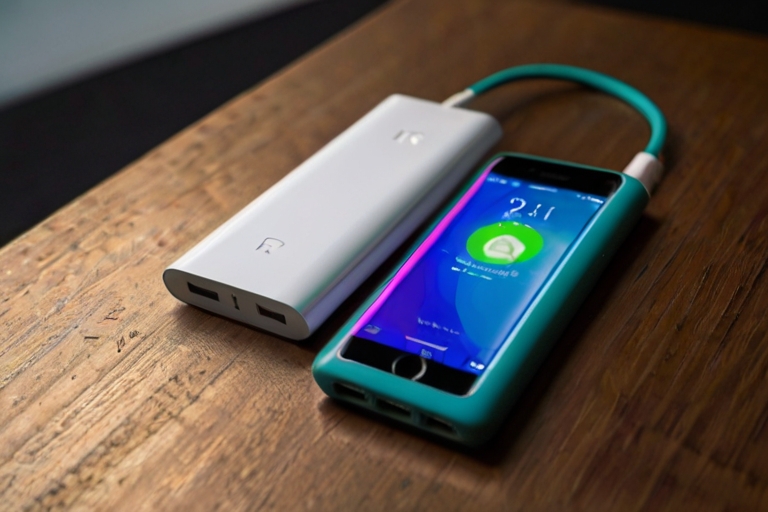In today’s fast-paced world, where our dependence on electronic devices continues to grow, the need for reliable power sources has become increasingly crucial. Enter the power bank, a portable charger that has revolutionized the way we stay connected on the go. Whether you’re traveling, commuting, or simply away from a power outlet, a power bank ensures that your devices stay charged and ready for use.
Table of Contents
How Power Banks Work

A. Components of a Power Bank
A typical power bank comprises a battery, charging circuitry, and one or more USB ports for connecting devices. The battery stores electrical energy, while the charging circuitry regulates the flow of power from the power bank to the connected device.
B. Charging Process Explained
When a device is plugged into a power bank, the charging circuitry detects it and initiates the transfer of power. The device’s battery then receives the electrical energy, replenishing its charge. Different power banks may have varying charging speeds and efficiency levels based on their specifications.
Types of Power Banks

A. Portable Power Banks
Portable power banks come in various sizes and capacities, ranging from small, pocket-sized models to larger, high-capacity ones. They are designed for easy carrying and are ideal for charging smartphones, tablets, and other USB-powered devices on the go.
B. Solar-Powered Power Banks
Solar-powered power banks utilize solar panels to harness energy from sunlight, providing an environmentally friendly charging solution. They are perfect for outdoor activities such as camping, hiking, or traveling in remote areas where access to traditional power sources may be limited.
C. Wireless Power Banks
Wireless power banks eliminate the need for cables by utilizing Qi wireless charging technology. They offer the convenience of simply placing your Qi-enabled device on the power bank’s charging pad to initiate charging, making them perfect for users who value simplicity and efficiency.
Factors to Consider When Buying a Power Bank

A. Capacity
The capacity of a power bank is measured in milliampere-hours (mAh) and determines how much charge it can store. Choose a power bank with a capacity that matches your device’s battery size for optimal charging performance.
B. Number of Ports
Consider the number of USB ports available on the power bank to ensure you can charge multiple devices simultaneously if needed.
C. Portability
If portability is a priority, opt for a compact and lightweight power bank that easily fits in your pocket or bag for on-the-go charging convenience.
D. Additional Features
Look for additional features such as fast charging support, LED indicators, built-in flashlights, and rugged construction for enhanced durability and functionality.
Top Brands in the Power Bank Market

A. Anker
Anker is renowned for its high-quality and reliable power banks, offering a wide range of options to suit various needs and budgets.
B. Xiaomi
Xiaomi’s power banks combine affordability with performance, making them a popular choice among consumers worldwide.
C. Belkin
Belkin specializes in innovative charging solutions, including power banks with advanced features such as power delivery and wireless charging.
D. RavPower
RavPower is known for its powerful and durable power banks, featuring high-capacity batteries and fast charging technology.
Benefits of Using a Power Bank
A. Convenience
Power banks provide on-the-go charging convenience, allowing you to stay connected wherever you are without worrying about running out of battery.
B. Emergency Backup
In emergency situations or during power outages, a power bank serves as a reliable backup power source for essential devices such as smartphones, tablets, and portable lights.
C. Extending Device Usage
With a power bank on hand, you can extend the usage time of your devices, enabling you to stay productive and entertained for longer periods without the need for a power outlet.
Tips for Properly Using and Maintaining Power Banks
A. Proper Charging Habits
Follow manufacturer recommendations for charging your power bank to ensure optimal performance and longevity. Avoid overcharging or discharging the battery completely, as this can affect its lifespan.
B. Storage Guidelines
Store your power bank in a cool, dry place away from direct sunlight and extreme temperatures to prevent damage to the battery and components.
C. Cleaning and Maintenance Tips
Periodically clean the charging ports and surfaces of your power bank using a soft, dry cloth to remove dust, dirt, and debris that may affect charging efficiency.
Common Misconceptions About Power Banks
A. Power Banks Damage Device Batteries
Contrary to popular belief, properly designed and used power banks do not damage device batteries. In fact, they provide a controlled and regulated charging process that helps extend battery life.
B. All Power Banks Are the Same
Power banks vary in terms of capacity, charging speed, and features, so it’s essential to choose one that meets your specific needs and preferences.
C. Power Banks Are Only for Smartphones
While smartphones are the most commonly charged devices using power banks, they can also charge a wide range of other devices, including tablets, laptops, cameras, and portable gaming consoles.
Innovative Uses of Power Banks
A. Powering Outdoor Activities
Whether you’re camping, hiking, or attending outdoor events, a power bank ensures that your essential devices stay charged, allowing you to capture memories, navigate trails, and stay connected with loved ones.
B. Charging Multiple Devices Simultaneously
Power banks with multiple USB ports enable you to charge multiple devices simultaneously, making them ideal for sharing with friends or family during travel or gatherings.
C. Powering Small Electronic Devices
In addition to smartphones and tablets, power banks can also charge smaller electronic devices such as Bluetooth headphones, fitness trackers, and portable speakers, enhancing your overall mobile experience.
The Future of Power Banks
A. Advancements in Power Bank Technology
With ongoing advancements in battery technology and charging efficiency, future power banks are expected to become more compact, powerful, and versatile, catering to the evolving needs of consumers.
B. Integration with Renewable Energy Sources
The integration of solar panels and other renewable energy sources into power bank designs will further enhance their sustainability and reduce reliance on traditional power grids.
C. Increasing Efficiency and Capacity
As demand for portable charging solutions continues to grow, manufacturers will focus on improving the efficiency and capacity of power banks to meet the needs of power-hungry devices and tech-savvy consumers.
Conclusion
Power banks have become indispensable accessories for modern living, offering convenient and reliable charging solutions for our ever-growing collection of electronic devices. Whether you’re a frequent traveler, outdoor enthusiast, or tech-savvy individual, investing in a quality power bank ensures that you stay connected and powered up whenever and wherever you need it most.
FAQs About Power Banks
How long does it take to charge a power bank?
The charging time for a power bank depends on its capacity and charging speed. On average, it takes a few hours to fully charge (Fast Charge) a power bank.
Can I bring a power bank on a plane?
Yes, you can bring a power bank on a plane in your carry on luggage. However, power banks with a capacity exceeding 100 watt-hours may require approval from the airline.
Are power banks waterproof?
Not all power banks are waterproof. It’s essential to check the manufacturer’s specifications to determine if your power bank is water-resistant or waterproof.
Can I charge my laptop with a power bank?
Yes, you can charge certain laptops with power banks that support laptop charging. However, you’ll need a power bank with sufficient capacity and power output to meet your laptop’s charging requirements.
How do I know if my power bank is fully charged?
Most power banks feature LED indicators that illuminate when the battery is fully charged. Additionally, you can check the power bank’s user manual or specifications for guidance on charging status indicators.




